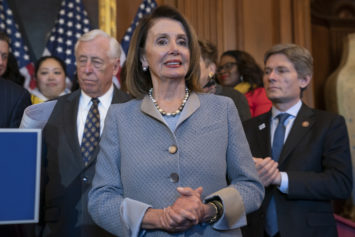With Obamacare just weeks away from launch, the public is divided into a contingent of people eager for the law’s implementation so that they can finally have access to healthcare, and another group that is seemingly trying any ploy they can think of to sink the signature of President Obama’s tenure—and the largest government social program in the last 50 years.
After Congress has voted more than 40 times—unsuccessfully—to repeal Obamacare, the latest Republican strategy is to push for a government shutdown if Democrats insist on providing the necessary funds to implement the Affordable Care Act. But that ruse appears to be fizzling out as Republican leaders realize the political suicide entailed.
There are less than two months left before Obamacare goes online and the public starts signing up for the healthcare exchanges, but thus far only 13 Senators have signed on to the “defund Obamacare” push.
“I have real problems obviously with Obamcare,” said Wisconsin Gov. Scott Walker. “But I think most Americans, even if they don’t like the size or growth of government, they still want something to work, something very fundamentally to work, and that’s a difference again between Washington and the state level.”
To try to drum up grassroots opposition, the conservative Heritage Action for America today launched a nine-city tour designed to increase support for the push for defunding. On the other side, the White House-allied Americans United for Change is vowing to match Heritage’s events with its own.
In the New York Times, liberal economist Paul Krugman said Republicans still don’t seem to have a basic understanding of the principles of Obamacare.
“I guess that after all the years of vilification it was predictable that Republican leaders would still fail to understand the principles behind health reform and that this would hamper their ability to craft an effective political response as the reform’s implementation draws near,” he wrote. “But their rudest shock is yet to come. You see, this thing isn’t going to be the often-predicted ‘train wreck.’ On the contrary, it’s going to work.”
Krugman continues, “Oh, there will be problems, especially in states where Republican governors and legislators are doing all they can to sabotage the implementation. But the basic thrust of Obamacare is, as I’ve just explained, coherent and even fairly simple. Moreover, all the early indications are that the law will, in fact, give millions of Americans who currently lack access to health insurance the coverage they need, while giving millions more a big break in their health care costs. And because so many people will see clear benefits, health reform will prove irreversible.”
To dispel the notion being pushed by conservatives that even young and healthy individuals would be better off simply not purchasing health insurance, the Obama administration is embarking on a number of public relations initiatives to sell the program. One of these—a video contest, complete with cash prizes designed to persuade younger consumers to get insurance—was unveiled today by Health and Human Services Secretary Kathleen Sebelius.
Partnering with the nonprofit Young Invincibles, the administration’s contest is asking interested participants to submit three different types of videos advertising the benefits of the exchanges: a song, an animated short or a video designed to convince viewers that they aren’t invincible. HHS will award $3,000 each to the creators of the three most popular and persuasive videos, while second and third place winners will get $2,500 each.
“Educating young people about new coverage options requires an all-hands-on-deck approach,” Secretary Sebelius is scheduled to say in her remarks. “For millions of young people, health insurance hasn’t been an option because it’s always been out of reach—because it costs too much, or isn’t offered through a job.”
Attracting young healthy individuals is key to the success of the healthcare exchanges because they provide insurers with low-risk customers who will help lower premiums across the board.


